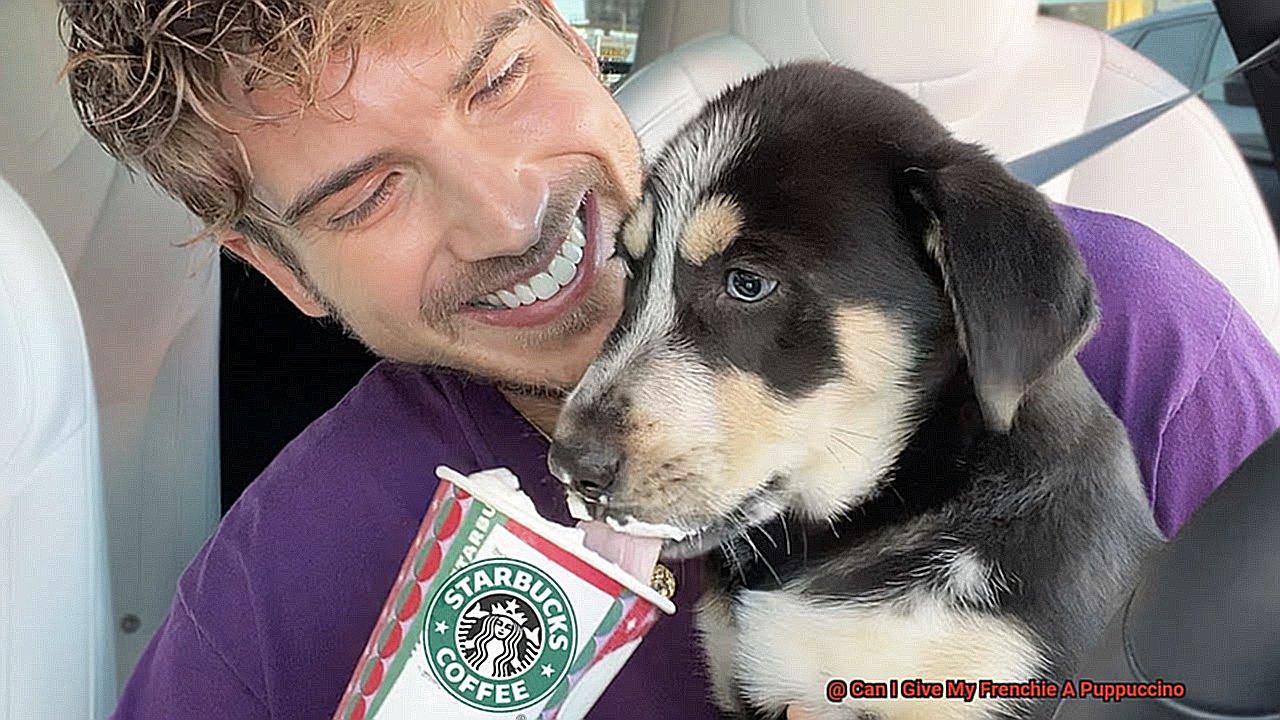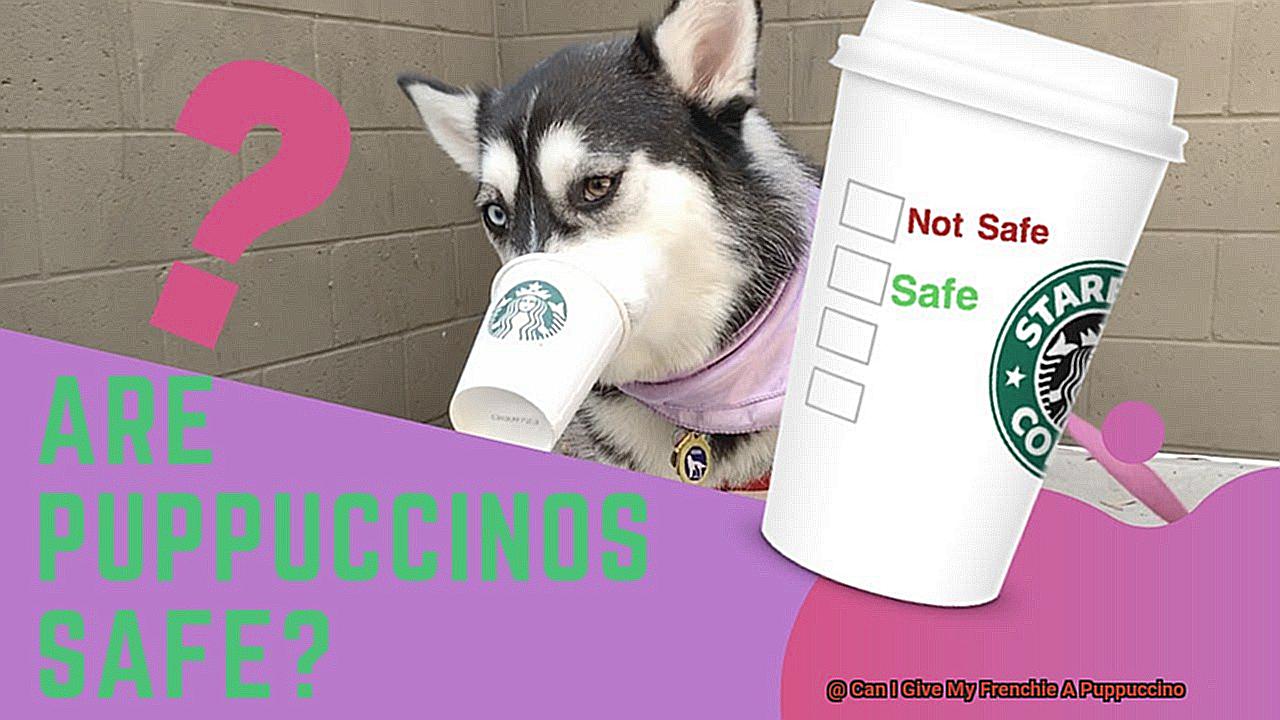Can I Give My Frenchie A Puppuccino?
As devoted dog owners, we’re always on the lookout for ways to pamper our precious pups. And when it comes to spoiling our French Bulldogs, the idea of treating them to a delectable Puppuccino might have you wagging your tail with excitement. But before you dive headfirst into this creamy canine delight, let’s fetch some facts and determine if it’s truly safe and beneficial for your furry friend.
A Puppuccino is like a little cup of heaven – whipped cream or frothed milk specially crafted by certain coffee joints just for our four-legged companions. It’s a treat that’s as visually appealing as it is tempting, promising moments of pure bliss for both you and your Frenchie. However, before indulging in this pup-friendly pleasure, we need to sniff out its benefits and potential risks.
Can I give my Frenchie a Puppuccino?
Contents
- 1 Can I give my Frenchie a Puppuccino?
- 2 French Bulldogs: Health Issues and Dietary Restrictions
- 3 Is a Puppuccino Suitable for French Bulldogs?
- 4 The Dangers of Whipped Cream for Frenchies
- 5 Brachycephalic Anatomy and Dietary Needs
- 6 Lactose Intolerance and Allergies in French Bulldogs
- 7 Alternatives to the Puppuccino for French Bulldogs
- 8 Consulting with Your Veterinarian Before Giving Treats
- 9 Tips for Introducing New Foods into Your Frenchie’s Diet
- 10 Conclusion
Benefits:
Treating your Frenchie to a Puppuccino can be an absolute tail-wagger. Not only does it bring them sheer joy, but it also creates positive associations with special outings or celebratory moments. Plus, it can serve as a paw-some reward for good behavior or during training sessions.
And if your Frenchie needs to watch their waistline (just like us humans), using a Puppuccino as a low-calorie treat option can be downright fetching.
Risks:
While the occasional Puppuccino can make tails wag with delight, there are some things to keep in mind. Whipped cream and frothed milk often contain lactose – something that can turn your Frenchie’s tummy into a rumbling volcano if they’re lactose intolerant. We’re talking upset stomachs, diarrhea dances, and gas attacks that could leave you reaching for the air freshener. Yikes.
And let’s not forget about those sneaky additives lurking in commercial whipped creams. Artificial sweeteners and flavorings might be a treat for our taste buds, but they can be downright dangerous for our furry friends. Always read the labels and make sure the ingredients won’t send your Frenchie on an unexpected trip to the vet.
The Verdict:
Can you give your Frenchie a Puppuccino? Absolutely. But like all good things in life, moderation is key. Be mindful of your dog’s individual dietary needs and sensit
French Bulldogs: Health Issues and Dietary Restrictions
French Bulldogs, or Frenchies, are beloved companions known for their friendly nature and adorable appearance. However, it’s important to be aware of their specific health issues and dietary restrictions to ensure their well-being. One question that often arises is whether it’s safe to give your Frenchie a Puppuccino, a popular treat offered at some coffee shops. In this article, we will explore the potential risks and considerations involved in giving your Frenchie a Puppuccino and provide alternative options for special treats.
Understanding French Bulldogs’ Dietary Restrictions:
French Bulldogs are prone to various health issues, including obesity and digestive problems. Their sensitive stomachs can be easily upset by inappropriate or low-quality foods. Additionally, some Frenchies may have allergies or intolerances to certain ingredients like dairy products.

It is crucial to observe your Frenchie’s individual reactions and work closely with your veterinarian to develop a suitable diet plan.
Risks of Giving Your Frenchie a Puppuccino:
A Puppuccino is a small cup filled with whipped cream, which is high in fat and calories. This treat can lead to weight gain and digestive upset in dogs, especially those who are prone to obesity or have sensitive stomachs. Furthermore, whipped cream contains dairy, which some French Bulldogs may be intolerant or allergic to. Introducing these ingredients without proper consideration can cause gastrointestinal issues such as diarrhea or vomiting.
Alternatives for Special Treats:
If you still want to give your Frenchie a special treat, there are alternative options available. Many pet stores offer dog-friendly whipped cream alternatives that are lower in fat and lactose-free. These options provide a safer way to indulge your Frenchie without risking their health. Remember, it’s always best to consult with your veterinarian before introducing any new foods or treats into your Frenchie’s diet.
Is a Puppuccino Suitable for French Bulldogs?
French Bulldogs are adorable and beloved companions, but their sensitive stomachs and potential health issues require careful consideration when it comes to their diet. One popular treat that dog owners often wonder about is the Puppuccino.
In this blog post, we will explore the potential impact of giving a Puppuccino to a French Bulldog and provide alternative options that can still satisfy their taste buds without compromising their health.
Understanding the Risks:
French Bulldogs are prone to allergies, digestive problems, and obesity, making it crucial to evaluate the potential risks of feeding them a Puppuccino. The main ingredient in a Puppuccino, whipped cream, is high in fat and calories. While a small amount may not harm your Frenchie immediately, excessive consumption can lead to weight gain and potential health complications.
Allergies and Intolerances:
French Bulldogs are also more susceptible to food allergies and intolerances. Dairy products like whipped cream can trigger allergic reactions in some dogs, causing symptoms such as itching, gastrointestinal upset, or even difficulty breathing. It’s important to monitor your Frenchie closely for any adverse reactions if you decide to give them a Puppuccino.
Brachycephalic Airway Syndrome:
French Bulldogs have short snouts, which puts them at higher risk for brachycephalic airway syndrome. Excessive consumption of fatty foods like whipped cream can worsen this condition and potentially lead to breathing difficulties. Therefore, it’s crucial to be mindful of the impact treats like Puppuccinos can have on their respiratory health.
Consult Your Veterinarian:
Before introducing any new treat into your Frenchie’s diet, it is essential to consult with your veterinarian. They will be able to assess your dog’s individual health needs and provide specific recommendations regarding treats like Puppuccinos. Your vet may suggest alternative options that are more suitable for your Frenchie’s unique dietary requirements.
Moderation is Key:
If you still want to treat your French Bulldog with a Puppuccino occasionally, it’s important to remember that moderation is key. Treats should never make up a significant portion of your Frenchie’s caloric intake. Monitoring their overall diet and ensuring they maintain a healthy weight is crucial for their overall well-being.
Alternative Options:
Fortunately, there are alternative options available if you still want to give your Frenchie a special treat. Some coffee shops offer lactose-free or dairy-free whipped cream substitutes that may be more suitable for dogs with sensitive stomachs or allergies. These alternatives can still provide your Frenchie with a delightful experience without compromising their health.

The Dangers of Whipped Cream for Frenchies
Today, we’re going to have a serious chat about the dangers of whipped cream for our furry friends. Now, I know what you’re thinking – whipped cream seems innocent enough, right? Well, not exactly. As much as we love spoiling our Frenchies, it’s important to be aware of the potential risks involved.
Let’s start with the elephant in the room: the high fat content. French Bulldogs are notorious for their sensitive digestive systems and tendency to pack on the pounds. Feeding them foods that are high in fat, like whipped cream, can exacerbate these issues. Nobody wants their Frenchie to become a chunky monkey, right?
But it doesn’t stop there. Whipped cream is also loaded with sugar. And while we humans might have a sweet tooth, dogs, including French Bulldogs, simply don’t have the same ability to process sugar as we do. Too much sugar can lead to health problems like dental issues and even diabetes. Yikes.
Now, here’s where things take a dangerous turn. Some whipped creams contain artificial sweeteners like xylitol. And let me tell you, xylitol is bad news for dogs. Even tiny amounts can cause a rapid drop in blood sugar levels and lead to seizures or liver failure. We definitely don’t want that happening to our beloved Frenchies.
But wait, there’s more. The texture of whipped cream can pose additional problems for our squish-faced pals. Some dogs may have trouble swallowing or digesting this creamy substance, leading to upset tummies or worse – choking hazards. And nobody wants their Frenchie dealing with gastrointestinal issues or gasping for air.
Now, I know what you might be thinking – “But my Frenchie has had whipped cream before and they were fine.” And hey, maybe they were lucky. Some dogs can tolerate small amounts without any issues. But why take the risk when there are safer alternatives available?
Instead of topping your Frenchie’s treat with whipped cream, consider natural yogurt or mashed bananas. These options are not only delicious but also much healthier for our four-legged friends. They won’t pose the same risks as whipped cream and can still satisfy your Frenchie’s taste buds.
Brachycephalic Anatomy and Dietary Needs
French Bulldogs are beloved pets known for their adorable and distinctive appearance.
However, their brachycephalic anatomy requires special attention to their dietary needs. In this blog post, we will explore the unique dietary considerations for French Bulldogs and how they differ from other breeds.
By understanding these needs, you can ensure that your Frenchie stays healthy and happy.
Digestibility Matters:
Due to their compromised respiratory system, French Bulldogs are more prone to flatulence and digestive issues. Choosing easily digestible foods can help alleviate these problems and prevent discomfort for your Frenchie. Look for high-quality dog food that is formulated to be gentle on sensitive stomachs.
Portion Control and Weight Management:
Brachycephalic breeds, including French Bulldogs, have lower exercise tolerance and are prone to weight gain. Obesity can further worsen their breathing difficulties and put strain on their joints. It is essential to control portion sizes and feed your Frenchie a balanced diet to maintain a healthy weight. Consult with your veterinarian to determine the appropriate amount of food based on your dog’s age, activity level, and overall health.
Identifying Food Allergies and Sensitivities:
Brachycephalic dogs may be more susceptible to food allergies or sensitivities, which can manifest as gastrointestinal issues or skin problems. Common allergens include grains and specific proteins. If you notice any signs of food intolerance, such as diarrhea or itching, consult with your veterinarian to identify trigger ingredients and adjust your Frenchie’s diet accordingly.
Treats: Proceed with Caution:
While treating your Frenchie is part of the joy of pet ownership, it is important to be cautious with treats, especially those made with dairy products like whipped cream. Dairy can cause stomach upset, diarrhea, or allergic reactions in some dogs, including French Bulldogs. Opt for safer alternatives like natural yogurt or mashed bananas, and always consult with your veterinarian before introducing new treats into your Frenchie’s diet.
Lactose Intolerance and Allergies in French Bulldogs
French Bulldogs are adorable and lovable companions, but like many other dog breeds, they can be prone to certain dietary issues such as lactose intolerance and allergies. In this comprehensive guide, we will explore what causes these conditions, how to identify the symptoms, and provide practical tips for managing them to ensure the well-being of your furry friend.
Lactose Intolerance in French Bulldogs
- Understanding lactose intolerance: What is lactose and why do some French Bulldogs struggle with it?
- Recognizing the symptoms: Diarrhea, gas, bloating, and stomach discomfort after consuming dairy products.
- Managing lactose intolerance: Avoiding dairy products and offering lactose-free alternatives.
- Recommended lactose-free alternatives: Nut-based milks like almond or coconut milk.
Allergies in French Bulldogs
- Common allergens: Food allergies (grains, proteins, additives), environmental allergens (pollen, dust mites), and flea bites.
- Identifying allergy symptoms: Itching, redness or inflammation of the skin, excessive scratching or chewing, sneezing, coughing, or watery eyes.
- Consulting a veterinarian: Importance of professional diagnosis and treatment options.
- Managing allergies: Avoiding known allergens, providing a balanced diet, and considering hypoallergenic dog food options.
Tips for Responsible Pet Ownership
- Reading ingredient labels: Understanding potential allergens in dog food and treats.
- Introduction of new foods: Gradual introduction to identify any adverse reactions.
- Elimination diet: A recommended approach to identify specific food allergens.
- Regular veterinary check-ups: Ensuring overall health and well-being.
By understanding lactose intolerance and allergies in French Bulldogs, you can make informed decisions about your Frenchie’s diet and ensure their optimal health. Remember, responsible pet ownership involves being mindful of their dietary needs and potential allergens.
From avoiding dairy products to identifying and managing food allergies, you can provide the best care for your beloved Frenchie companion.
Alternatives to the Puppuccino for French Bulldogs
French Bulldogs are known for their sensitive stomachs and allergies, making it important to choose treats that are safe and healthy for them. While the popular Puppuccino may not be suitable for every Frenchie, there are plenty of delicious alternatives that can satisfy their taste buds without causing any digestive issues.
In this article, we will explore some homemade treats that are perfect for French Bulldogs.
Homemade Dog-Friendly Whipped Cream:
One alternative to the Puppuccino is a homemade dog-friendly whipped cream made from coconut milk or yogurt. These dairy-free options are gentle on your Frenchie’s stomach and can be whipped until they reach a creamy consistency. Serve a small dollop as a special treat or use it as a topping for their regular meals.
Frozen Fruit Treats:
Fruits like strawberries, blueberries, and bananas are not only safe but also packed with essential vitamins and antioxidants. Blend these fruits with water or coconut water and freeze them in ice cube trays. These frozen fruit treats will not only keep your Frenchie refreshed but also provide them with a healthy boost.
Frozen Bone Broth Treats:
Bone broth is highly nutritious and soothing for the digestive system, making it an ideal treat for French Bulldogs with sensitive stomachs. Simmer bones (such as chicken or beef) in water for several hours to make a rich bone broth. Once cooled, pour the broth into ice cube trays and freeze them. These frozen bone broth treats will be a tasty and nourishing delight for your Frenchie.
Remember:
When introducing any new treats to your Frenchie’s diet, it’s important to monitor their reaction and ensure they do not have any allergies or adverse effects. Always consult with your veterinarian before making any changes to their diet or introducing new treats.
Consulting with Your Veterinarian Before Giving Treats
We all want the best for our furry friends, and that includes giving them tasty treats. But before you spoil your French Bulldog with a Puppuccino or any other treat, it’s crucial to consult with your veterinarian. In this post, we’ll explore why it’s important and how it can benefit your beloved Frenchie.
Personalized Advice for Your Frenchie’s Unique Needs:
French Bulldogs have specific dietary needs and sensitivities that may make certain treats unsuitable for them. By consulting with your vet, you can ensure that you’re aware of any potential risks or concerns. With their knowledge of your Frenchie’s medical history, existing health conditions, and dietary requirements, your vet can provide personalized advice on safe and appropriate treats.
Avoiding Harmful Ingredients:
Some treats, like the famous Puppuccino, may contain ingredients that can be harmful to dogs. For example, the whipped cream often used in a Puppuccino contains dairy, which can cause digestive issues or allergies in some dogs. Your vet will guide you on which ingredients to avoid and help you choose healthier alternatives.
Weight Management:
Maintaining a healthy weight is essential for French Bulldogs to prevent obesity-related health issues. Your vet will consider your Frenchie’s weight and any weight management goals you may have when recommending treats. They will advise you on portion control and suggest low-calorie options that still satisfy your dog’s taste buds.
Pre-existing Health Conditions:
If your Frenchie has allergies, diabetes, kidney disease, or any other pre-existing health conditions, consulting with your vet becomes even more crucial. Certain treats may worsen these conditions or interfere with medications. Your vet will provide guidance on suitable treats or may suggest avoiding certain ingredients altogether.
Finding Suitable Alternatives:
Your vet can recommend alternative treats that are safe and enjoyable for your Frenchie. They may suggest options specifically formulated for French Bulldogs or those that cater to their unique dietary needs. These alternatives will keep your furry friend happy and healthy.
Maintaining Nutritional Balance:
While treats are a fun addition to your Frenchie’s diet, it’s important not to compromise their nutritional balance. Your vet will guide you on how to incorporate treats without affecting their overall diet. This ensures that your Frenchie receives all the necessary nutrients from their regular meals.
Tips for Introducing New Foods into Your Frenchie’s Diet
French Bulldogs, or Frenchies, are adorable and loveable dogs known for their friendly and affectionate nature. As a Frenchie owner, you want to spoil your furry friend and give them special treats from time to time. One treat that has gained popularity in recent years is the Puppuccino, a small cup filled with whipped cream designed specifically for dogs to enjoy. But before you hand over that cup to your Frenchie, there are a few things you should consider.
First and foremost, it’s important to think about your Frenchie’s individual health needs and any dietary restrictions they may have. Frenchies are prone to certain health issues, such as obesity and allergies. Whipped cream, the main ingredient in a Puppuccino, is high in fat and calories. It can lead to weight gain and digestive upset in dogs, especially those who are prone to obesity or have sensitive stomachs.
Additionally, French Bulldogs have a unique anatomy. They are brachycephalic dogs, which means they have short noses and flat faces. This anatomy can make it difficult for them to eat certain foods, particularly those that are high in fat or require excessive chewing. Giving your Frenchie a Puppuccino could potentially cause choking or other breathing difficulties.
Furthermore, some French Bulldogs may be lactose intolerant or have allergies to dairy products. Whipped cream is made from dairy and can cause digestive issues, such as diarrhea or vomiting, in dogs with these sensitivities.
But don’t worry. If you still want to give your Frenchie a special treat, there are alternative options available. Many pet stores offer dog-friendly whipped cream alternatives that are lower in fat and lactose-free. These alternatives are specifically designed for dogs and can be a safer option for your Frenchie.
As always, it’s best to consult with your veterinarian before introducing any new foods or treats into your Frenchie’s diet. They will be able to provide personalized advice based on your dog’s specific needs and health conditions. Your vet knows your Frenchie best and can guide you in making the right choices for their overall health and well-being.
Conclusion
In conclusion, it is generally safe to give your Frenchie a Puppuccino as an occasional treat. However, it is important to remember that moderation is key. Puppuccinos are made with whipped cream, which can be high in fat and sugar. Therefore, it is best to limit the frequency and portion size of this indulgence.
Furthermore, it’s crucial to consider any potential allergies or sensitivities your Frenchie may have. Some dogs may experience digestive issues or allergic reactions to certain ingredients in whipped cream. It’s always wise to consult with your veterinarian before introducing any new food or treat into your dog’s diet.
Additionally, keep in mind that Puppuccinos should not replace a balanced and nutritious diet for your Frenchie. While they may enjoy the occasional taste of this creamy delight, their main source of nutrition should come from high-quality dog food specifically formulated for their breed and age.
Lastly, when treating your Frenchie to a Puppuccino, ensure that it is served at an appropriate temperature. Whipped cream straight from the fridge can be too cold for dogs and may cause discomfort or even brain freeze. Allow the Puppuccino to sit out for a few minutes until it reaches a comfortable temperature for your furry friend.
In summary, while giving your Frenchie a Puppuccino can be a delightful indulgence, it should be done in moderation and with consideration for their individual needs.




